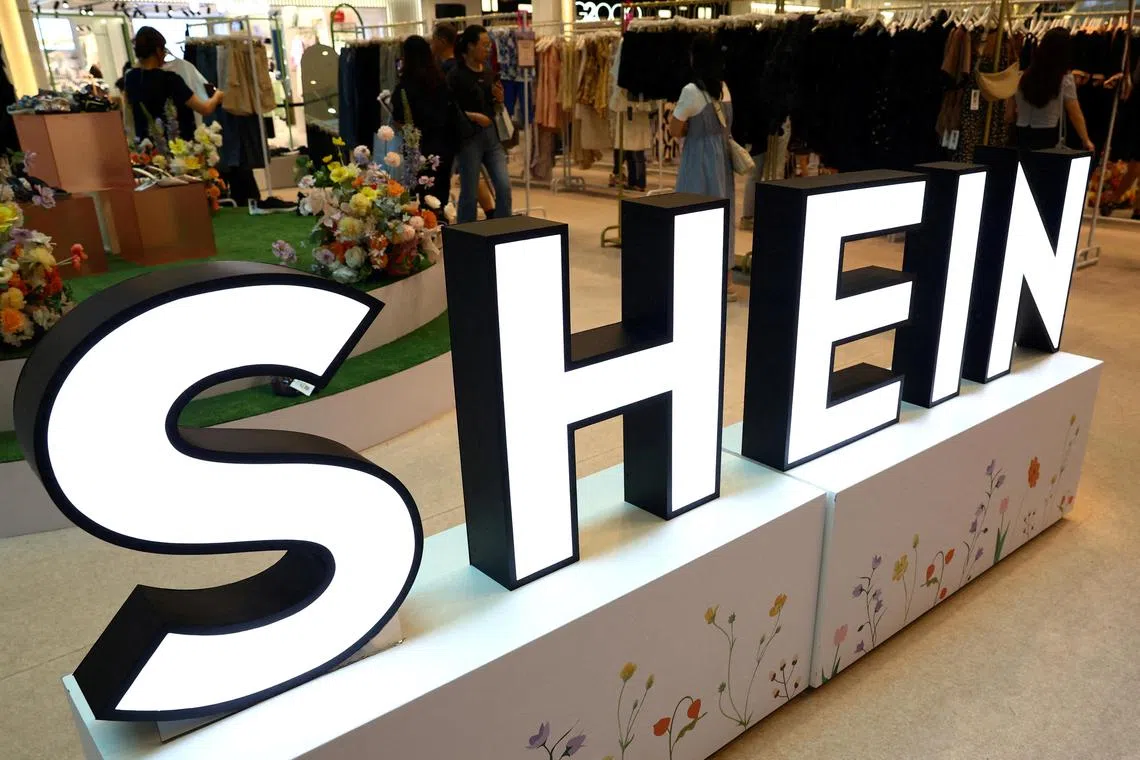Products found with high levels of toxic chemicals removed from website: Shein
Sign up now: Get ST's newsletters delivered to your inbox

South Korean authorities found some children’s products sold by Shein to contain toxic substances.
PHOTO: REUTERS
Follow topic:
SINGAPORE - Online retailer Shein has removed from its website the products that the South Korean authorities found to have high levels of toxic substances.
Singapore’s Consumer Product Safety Office (CPSO) and Singapore-headquartered Shein separately said, in response to The Straits Times’ queries, that the tainted products have been removed from its online catalogue while investigations are ongoing.
CPSO, a government agency that ensures consumer products here are safe for use, said it has not received any feedback from consumers on safety issues relating to products sold by Shein.
The authorities in Seoul found that some children’s products, including shoes and leather bags, sold by the Chinese-founded company contained toxic substances like phthalates in amounts hundreds of times above acceptable levels, AFP reported on May 28.
“The CPSO has been in touch with Shein and we understand that they are conducting further investigations on the products that were identified to be unsafe by the Seoul authorities,” said a CPSO spokesman, adding that it will continue to engage Shein and the South Korean regulators to follow up on investigations.
“We will work with the platform to remove the sale of products that are found to be non-compliant with requirements under the Consumer Protection (Consumer Goods Safety Requirements) Regulations in Singapore,” he added.
CPSO advises consumers to contact Shein for clarification and follow-up action as needed, if they have concerns over goods they recently bought from the retailer.
The Shein spokesman said, without elaborating, that the company will take “appropriate follow-up action” against the supplier if its products are found to have flouted safety standards.
He said the company works closely with international third-party testing agencies, such as Intertek, SGS, BV and TUV, to regularly test suppliers’ compliance to Shein’s product safety standards. He said more than 400,000 such chemical safety tests had been done in the past year.
Some products tested by the South Korean authorities were found to contain high amounts of phthalates – chemicals widely used to soften plastics, AFP said in an earlier report, adding that the Seoul authorities have been conducting weekly inspections of items sold by platforms including Shein, Temu and AliExpress.
In the latest round, one pair of shoes was found to contain 428 times the permitted levels of phthalates – the highest observed so far during the Seoul inspections – and three bags had amounts as high as 153 times the limit, the city government said.
Phthalates are found in thousands of products, including containers, beauty products and toys. They have been known for decades to cause hormone disruptions and have been linked to obesity, heart disease, some cancers and fertility problems.
The CPSO said it routinely monitors the market, as well as the safety of general consumer goods through avenues such as exchange of safety information and alerts with its overseas and local partners.
It also relies on information from consumers, suppliers, consumer associations and other regulatory authorities in Singapore.
Under the Consumer Protection (Consumer Goods Safety Requirements) Regulations, suppliers are required to ensure that general consumer goods sold in Singapore comply with relevant international safety standards – such as those formulated or adopted and published by the International Organisation for Standardisation, European Committee for Standardisation or ASTM International.
Products that do not comply with these requirements cannot be sold here, said CPSO.
Under the regulations, the CPSO can issue stop-sale notices for non-compliant products and those who fail to follow CPSO’s instructions can be fined up to S$10,000, jailed for up to two years, or both.


